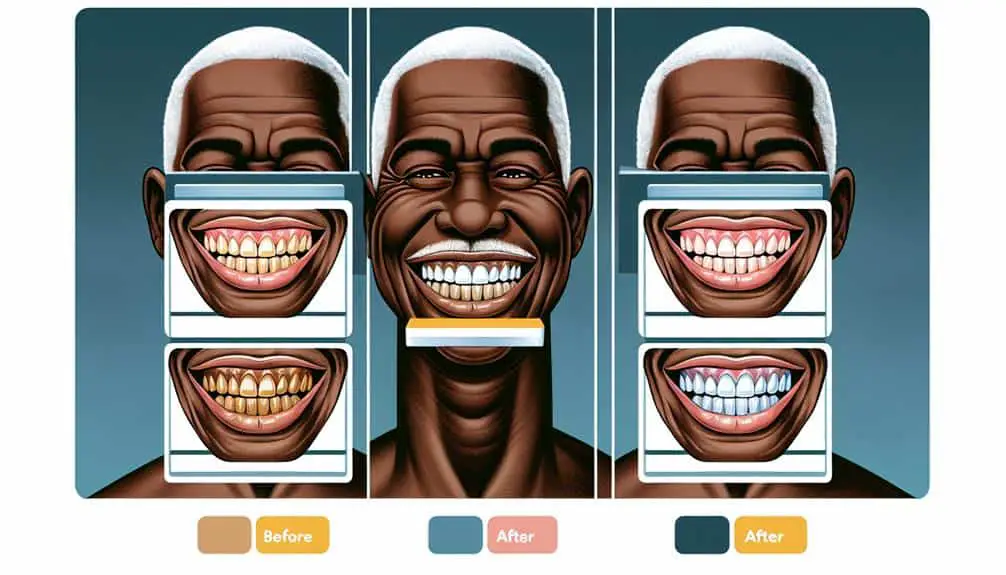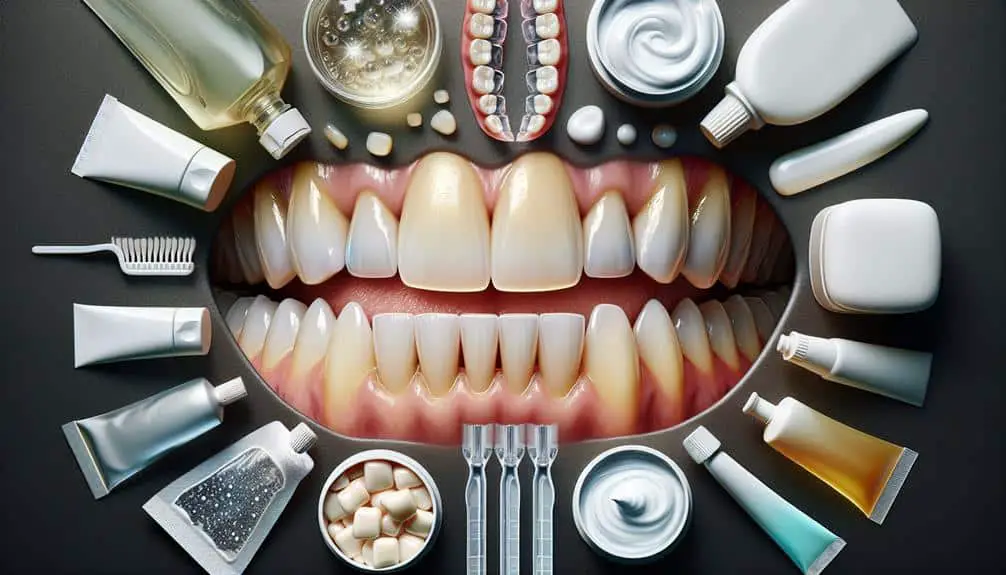When choosing whitening strips for older teeth, prioritize those formulated to address sensitivity and safeguard enamel, like those containing potassium nitrate or fluoride. These ingredients can assist you in achieving successful whitening outcomes while maintaining your dental health. By concentrating on sensitivity and enamel protection, you can guarantee a brighter smile without jeopardizing your oral health.
Key Points
- Choose whitening strips with potassium nitrate or fluoride for sensitivity management.
- Prioritize long-term efficacy to maintain whitened results.
- Opt for products gentle on enamel to prevent damage.
- Consider user reviews for insights on product effectiveness.
- Select strips that minimize sensitivity while whitening effectively.
Understanding Aging Teeth and Whitening
As you age, the natural wear and tear on your teeth can lead to discoloration that may benefit from whitening treatments. The aging process affects teeth in various ways, such as enamel thinning and dentin darkening, contributing to tooth discoloration. Enamel, the outer layer of the tooth, naturally wears down over time, revealing the yellowish dentin underneath.
Additionally, lifestyle factors like consuming staining foods and drinks can exacerbate tooth discoloration as you age.
Tooth discoloration can impact your confidence and overall appearance, making whitening treatments a popular choice for many individuals. Understanding how the aging process influences tooth coloration is important when considering whitening options. It's essential to consult with a dental professional to determine the most suitable whitening approach based on your specific needs and dental health status.
Incorporating whitening strips into your oral care routine can help diminish the effects of aging on your teeth, restoring a brighter and more youthful smile. Remember to follow the instructions carefully and be consistent with your whitening regimen for best results.
Factors to Consider Before Whitening
Before proceeding with whitening treatments, it's essential to carefully consider several factors to guarantee ideal outcomes and maintain your dental health. First and foremost, sensitivity concerns should be taken into account. Aging teeth are often more sensitive due to enamel wear, exposed dentin, or existing dental issues. It's crucial to consult with your dentist to assess your teeth's sensitivity levels and determine the most suitable whitening approach to prevent discomfort or pain.
Moreover, when contemplating whitening for aged teeth, it's important to weigh the long-term results. While whitening strips can effectively brighten your smile, especially when dealing with age-related discoloration, understanding how long the results will last is key. Factors like lifestyle habits, oral hygiene maintenance, and dietary choices can influence the longevity of the whitening effects. By carefully considering these aspects, you can make an informed decision that aligns with your dental health goals and ensures a radiant smile for an extended period.
Best Whitening Strips for Seniors
Zero in on the most effective whitening strips tailored for seniors to achieve peak results and enhance your smile's brightness. When selecting whitening strips for seniors, sensitivity management is vital. Look for products specifically formulated to minimize sensitivity while still effectively whitening aged teeth. These strips often contain ingredients like potassium nitrate or fluoride to help combat sensitivity issues that are common in older individuals.
In addition to sensitivity management, seniors should also consider the long-term efficacy of the whitening strips. Opt for products that not only provide immediate results but also offer lasting effects. Reading reviews from other seniors who've used the whitening strips can give you valuable insights into their long-term effectiveness.
Tips for Safely Whitening Aged Teeth
For safely whitening aged teeth, prioritize gentle formulations that cater to sensitivity while effectively brightening your smile. Sensitivity management is important when considering whitening products for aging teeth. Look for whitening strips that are specifically designed to be gentle on sensitive teeth while still providing effective whitening results. These gentle formulas are often milder on enamel, which is significant for preserving the health of your teeth, especially as you age.
When selecting whitening strips, opt for products that offer enamel protection. Enamel is the outer layer of your teeth and plays an essential role in maintaining dental health. Choosing whitening strips that help protect enamel can prevent damage and sensitivity, ensuring a safer whitening experience for your aged teeth.
Remember to follow the instructions provided with the whitening strips carefully to achieve the best results while safeguarding the health of your teeth. Prioritizing sensitivity management and enamel protection can help you safely whiten your aged teeth and achieve a brighter, healthier smile.
Maintaining Whitened Teeth Over Time
To maintain the whiteness of your teeth over time, establish a consistent oral care routine that includes gentle whitening products and regular dental check-ups. Consistency is crucial to preserving the results of your whitening treatment. Choose toothpaste and mouthwash specifically formulated for whitening to prevent staining and sustain the brightness of your smile. Be mindful of teeth sensitivity, especially after whitening treatments. If you experience increased sensitivity, consider using a toothpaste designed for sensitive teeth or consult your dentist for recommendations.
Regular dental check-ups are essential for the longevity of your whitened teeth. Dentists can identify any issues early on and provide professional cleaning to remove surface stains that may dull your teeth. Additionally, they can offer guidance on maintaining your whitened teeth at home. Remember to follow any post-whitening care instructions provided by your dentist or the whitening product manufacturer to secure the best results. By incorporating these practices into your oral care routine, you can enjoy a bright, white smile for a longer period.
Frequently Asked Questions
Can Whitening Strips Help With Discoloration Caused by Medication or Health Conditions Common in Seniors?
Whitening strips may assist with discoloration from medication or health issues in seniors. Consider consulting a dentist for tailored advice on addressing oral health concerns related to aging and discoloration caused by medications.
Are There Any Specific Ingredients in Whitening Strips That Seniors Should Avoid Due to Potential Sensitivity Issues?
When choosing whitening strips, be mindful of ingredient sensitivities. Some seniors may experience tooth sensitivity or gum issues. Follow proper application techniques to minimize discomfort. Consult with a dental professional for personalized recommendations.
How Long Should Seniors Wait Between Whitening Treatments to Prevent Damage to Their Enamel?
To protect your enamel and avoid sensitivity, wait at least 48 hours between whitening treatments. This waiting period helps prevent damage and deep staining. Prioritize enamel protection by following suggested waiting periods for best results and oral health.
Can Whitening Strips Effectively Remove Deep Stains or Should Seniors Consider Professional Whitening Treatments Instead?
To effectively tackle deep stains, consider professional treatments as alternatives to whitening strips. Professionals can tailor treatments for better whitening efficacy and safeguard enamel. Consult with experts for personalized solutions to address your specific needs.
Are There Any Long-Term Effects of Using Whitening Strips on Aged Teeth That Seniors Should Be Aware Of?
When considering the long-term impacts of whitening strips on aged teeth, sensitivity concerns may arise. It's important to explore alternative solutions and preventative measures to maintain oral health while achieving desired results.
Conclusion
In the journey of life, our teeth may age and lose their luster like fading stars in the night sky. But fear not, for the best whitening strips for aged teeth can bring back the brilliance and radiance of youth.
By considering factors like sensitivity and effectiveness, seniors can confidently choose the right strips to brighten their smiles.
Remember to follow tips for safe whitening and maintain the glow for years to come.



